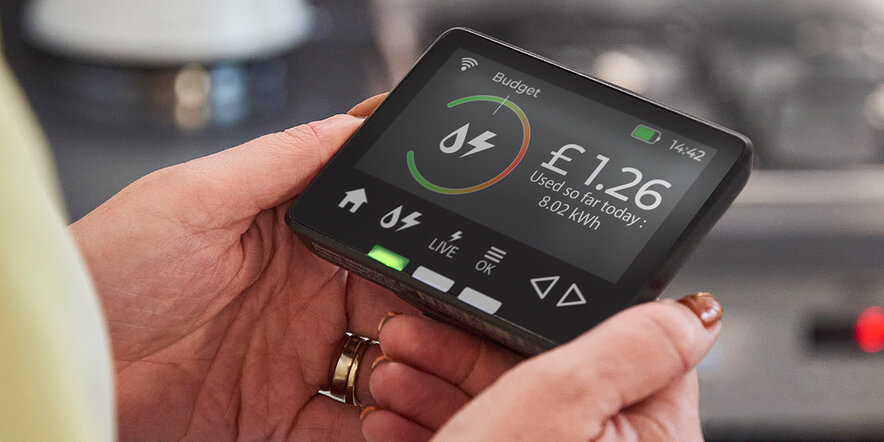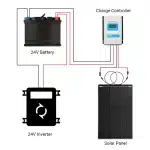Table of Contents
Can I Sell Excess Energy From Solar Panels in the UK?
In the UK, many people associate solar energy with sunny climates, leading them to believe that solar power isn’t the ideal solution due to the country’s unpredictable weather. However, the reality is quite different. Solar power is gaining popularity for its clean, renewable nature and the independence it offers, even in regions where the sun doesn’t shine as frequently. With solar panels for homes, homeowners can still harness significant energy from daylight, even on overcast days. One of the biggest questions homeowners have when considering solar panels for homes is: Can I sell excess energy from solar panels in the UK? The answer is yes! Not only can you reduce your reliance on the grid, but selling your excess energy is a fantastic way to maximize the value of your solar system.
In this article, we’ll explore whether you can sell excess solar energy, how much you can earn, and whether it’s better to store or sell unused electricity.
Yes, UK homeowners with solar panels can sell excess energy to the grid under the Smart Export Guarantee (SEG) program, which allows them to earn money for unused electricity by exporting it to the grid.
Solar Energy and the Potential for Unused Electricity
Solar panels generate electricity when sunlight hits them, but production varies with the weather, seasons, and time of day. This means there are times when solar systems generate more electricity than you can immediately use, especially during sunny days in spring and summer.Rather than letting this unused electricity go to waste, you can either store it using a battery system or export it back to the grid and earn money. This article will cover both approaches so that you can make the best choice for your home.
What is the Smart Export Guarantee (SEG) and How Does It Work?
The Smart Export Guarantee (SEG) is a government initiative launched in 2020 to help small-scale renewable energy producers, including homeowners, earn money by selling their surplus electricity back to the National Grid. By using the SEG, eligible homeowners can be compensated for each unit of electricity they export, allowing them to recoup their solar panel investment sooner and potentially even profit from it.
Eligibility Requirements: To qualify, your solar system must be installed by a certified installer and use approved components.
SEG Tariffs: Different suppliers offer varying rates, with some offering fixed rates while others offer flexible tariffs that change based on wholesale prices.
Contractual Agreements: Once you select a supplier and agree to their SEG rate, you’ll sign a contract that outlines payment terms and requirements.
SEG payments provide an incentive for homeowners to use renewable energy and contribute to a greener grid.SEG
You must also have an export meter, or smart meter, to measure your energy production and send readings to your SEG supplier (known as an SEG licensee). We highly recommend having your circumstances properly assessed to choose the best solar export tariff in the UK.
Selling energy back to the grid can be a quick and easy way to make the most of your solar panels. As long as you understand what criteria and documentation you need, this will be a valuable resource for solar owners to access.
How Does the SEG Work?
Under the SEG scheme, licensed electricity suppliers with over 150,000 customers are required to offer a minimum of one export tariff to small-scale renewable energy generators. This means that if you have solar panels and generate surplus energy, you can sign up with one of these suppliers to receive payments for the electricity you export. The SEG offers two main types of tariffs:
- Fixed-rate Tariffs: These offer a consistent rate per kilowatt-hour (kWh) for the electricity you export, regardless of market conditions.
- Variable-rate Tariffs: With these tariffs, the payment rate changes according to supply and demand. This can mean higher payouts during peak times, though the rate may vary.
These tariffs must be above zero, so you’re guaranteed some level of payment. However, it’s worth comparing offers from different suppliers to find the best rate, as some companies may be more competitive than others.
Steps to Start Selling Your Surplus Electricity
If you’re interested in selling your excess solar electricity, here’s how to get started:
- Ensure Your System is Certified: Your solar PV system must be certified under the Microgeneration Certification Scheme (MCS) or an equivalent standard to qualify for the SEG. This certification ensures your system meets specific safety and quality standards, which is essential for participating in the SEG.
- Install a Smart Meter: To receive SEG payments, you’ll need a smart meter capable of measuring the electricity you export. A smart meter records half-hourly export data, enabling accurate tracking of how much surplus electricity you send back to the grid. If you don’t already have a smart meter, your energy provider can help arrange installation.
- Choose Your SEG Licensee: Not all energy suppliers offer the same rates or terms under the SEG. Comparing different suppliers’ tariffs can help you find one that aligns with your needs, whether you prefer a fixed or variable rate. The Energy Saving Trust and Ofgem’s websites provide helpful resources for comparing SEG tariffs and finding an approved supplier.
- Apply for the SEG Tariff: Once you’ve selected a licensee, you can apply for their SEG tariff. You’ll need to submit documents such as your MCS certification, smart meter details, and other information about your solar panel system. Once approved, you’ll enter a contract specifying the tariff, payment frequency, and any conditions related to your exported electricity.
- Start Earning from Your Solar Power: After approval, you’ll start receiving payments for every kWh of electricity you export to the grid. These payments can be made quarterly or annually, depending on your supplier’s terms. In addition to covering some or all of your energy costs, these payments can reduce the payback period on your initial solar panel investment.
Maximizing Your SEG Earnings
To make the most of your solar power setup and SEG earnings, consider these tips:
- Use Energy Wisely: Maximize self-consumption by using energy-intensive appliances during the day when your panels are generating power. This reduces the amount of electricity you need to buy from the grid.
- Install Battery Storage: Battery storage systems allow you to store excess electricity for use at night or during periods of low sunlight. Some suppliers allow you to export stored energy, potentially increasing your SEG payments.
- Stay Updated on Tariffs: SEG tariffs can change, and new offers may arise. Regularly checking for competitive rates can ensure you’re maximizing your earnings.
How Much Money Can You Earn Selling Excess Electricity?
The amount you earn through SEG depends on several factors, including your supplier’s rates, your system’s capacity, and how much energy you export. As of now, SEG rates in the UK typically range from around 1p to 5.5p per kilowatt-hour (kWh), though some suppliers offer slightly higher rates.
Here’s an example calculation:If you export 1,000 kWh over a year and your supplier offers 5p per kWh, you could earn around £50 annually.
While SEG payments may not fully offset the cost of your system, they provide a way to earn passive income from your solar investment while supporting the renewable energy market.
How Does Selling Solar Electricity Back to the Grid Work in the UK?
Selling your excess solar energy to the grid involves a few simple steps:
Install Solar Panels: if install solar panels First, your system must be certified and installed by a recognized professional to qualify for SEG.
Use a Smart Meter: A smart meter tracks the electricity you generate and export to the grid. This data helps your supplier calculate your payment.
Export to the Grid: When your system produces more electricity than you need, the excess is automatically sent to the grid.
Receive Payments: Your supplier compensates you for the energy you export based on your SEG tariff rate, either monthly or annually.
Should You Store or Sell Unused Solar Electricity?
With the SEG in place, you can earn income by selling excess energy. However, you may also consider storing it for later use. Here’s a look at the pros and cons of each approach:
Benefits of Storing Excess Solar Electricity
Energy Independence: With a storage battery, you can rely less on the grid, especially during power outages.
Benefits of Storing Excess Solar Electricity
Cost Savings: Using stored electricity during peak hours can reduce your energy bills.
Better Energy Management: Batteries allow you to use clean energy even when the sun isn’t shining, making your household more self-sufficient.
Benefits of Selling Excess Electricity
Passive Income: SEG payments offer a steady income from unused electricity.
Environmental Impact: By exporting clean energy, you help reduce the demand for non-renewable sources on the grid.
Easy Integration: Selling to the grid doesn’t require additional equipment beyond a smart meter, making it a simpler option than storage.
Ultimately, the choice between storage and selling depends on your household needs. If you prefer grid independence and have high energy use in the evening, a battery might be beneficial. If you prioritize earning passive income, exporting through SEG is an ideal option.
Is Solar Power Worth It in the UK?
Despite the UK’s less predictable sunlight, solar panels are proving valuable to many homeowners. Advances in solar technology mean that even on cloudy days, modern panels can capture enough energy to significantly offset household electricity costs. Combined with the SEG, solar energy offers a viable path toward reducing reliance on the grid and contributing to a more sustainable energy landscape.
Selling surplus solar electricity is an excellent way for UK homeowners to accelerate their solar panel payback period, decrease electricity bills, and even turn a profit. So, if you’re considering installing solar panels or are already generating more power than you need, the Smart Export Guarantee makes it possible to earn from the power of the sun, even in the UK’s varied climate.







